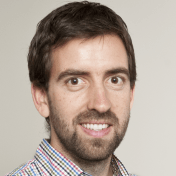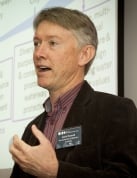Presentations from the How to use the BeST tool from CIRIA – a cost-benefit analysis tool for WSUD are now available:
Introduction of CRCWSC program/project B4.2 Socio Technical Flood Resilience – Berry Gersonius
The case for benefit estimation of WSUD – Assela Pathirana
Oaklands Wetland stormwater reuse scheme – Glynn Rickets
Benefits of Oaklands Wetland & stormwater reuse scheme – Glynn Rickets
Introduction to BeST tool from CIRIA – Berry Gersonius
CRC for Water Sensitive Cities Tranche 1 studies on economics – David Pannell
Overview
Water sensitive urban design (WSUD) or sustainable drainage systems (SuDS) are frequently considered as part of wider planning and design strategies for Water Sensitive Cities because they provide a wide range of benefits beyond simply dealing with stormwater. This session will introduce a spreadsheet tool, known as BeST (benefits of SuDS tool, developed by CIRIA, UK), to evaluate the benefits that SuDS provide. The benefits that BeST includes are linked with ecosystem services (ESS) categories and sustainability categories in terms of the ‘triple-bottom-line’ of financial, social and environmental. BeST has been tested and applied as a part of the project ‘B4: Social Technical Flood Resilience’, part of the CRC for Water Sensitive Cities.
Presenters/trainers
Berry Gersonius, Senior Lecturer in Urban Flood Resilience, UNESCO-IHE and CRC for Water Sensitive Cities
Glynn Ricketts, Water Resources Coordinator, City of Marion
Assela Pathirana, Associate Professor of Integrated Urban Water Cycle Management, UNESCO-IHE and CRC for Water Sensitive Cities
David Pannell, Professor and Head of School of Agricultural and Resource Economics, University of Western Australia and CRC for Water Sensitive Cities
Mellissa Bradley, Program Manager, Water Sensitive SA
Elsie Mann, International Water Centre Master’s student
Who should attend
Local government departments, particularly in urban planning, environmental management, and urban drainage and water management, their consultants and other professionals working with water and those engaged in the delivery of other infrastructure and service systems that interact with water, such as green spaces and highways.
What to bring
- It is recommended that all participants have their own laptop with MS Excel. Those without a laptop can share and work in small groups.
You will be provided with
- The CIRIA BeST tool MS Excel spreadsheet will be provided to participants on a data stick, however it is desirable that the participant’s laptop have the capability to connect to the internet.
- Details of a case study project for input into the tool.
Biographies
Berry Gersonius, Senior Lecturer in Urban Flood Resilience, UNESCO-IHE and CRC for Water Sensitive Cities
 Berry Gersonius (MSc in Civil Engineering from TUDelft) is Senior Lecturer in Urban Flood Resilience at UNESCO-IHE. The scope of his work covers education, research and capacity building in the field of urban water and flood risk management. In 2012, he finalized his PhD study, entitled ‘The resilience approach to climate adaptation applied for flood risk’. His research interests are specifically on the application of resilience to urban water systems, on the development of adaptation policy pathways, and on the delivery of water sensitive cities.
Berry Gersonius (MSc in Civil Engineering from TUDelft) is Senior Lecturer in Urban Flood Resilience at UNESCO-IHE. The scope of his work covers education, research and capacity building in the field of urban water and flood risk management. In 2012, he finalized his PhD study, entitled ‘The resilience approach to climate adaptation applied for flood risk’. His research interests are specifically on the application of resilience to urban water systems, on the development of adaptation policy pathways, and on the delivery of water sensitive cities.
He has been involved as a project member in various national and international research projects (e.g. FP7 FloodProbe, Interreg IVB MARE, COST C22 Urban Flood Management, COM23 Water Robust Building, and UFM Dordrecht). Currently he participates in the CRC WSC project on Socio-Technical Flood Resilience, the ADB project MARE Indonesia, the WOTRO IP Dynamic Deltas, and the Interreg IVB project CAMINO. Berry Gersonius has been reviewer for various international journals (e.g. HESS, J of Hydrology, JFRM, Risk Analysis, Water Management, Water Policy, and Water Research). He is responsible for the course of Water Resilient Cities within the Flood Resilience (Chair) Group.
He is also an expert on flood safety and stormwater for the City of Dordrecht. At Dordrecht, Berry Gersonius is working on the development of an integrated flood risk management strategy for dike ring 22, based on the concept of multi-level safety (i.e. addressing protection, prevention and preparedness). He is a member of the regional Delta Programme Rhine Estuary-Drechtsteden
Assela Pathirana, Associate Professor of Integrated Urban Water Cycle Management, UNESCO-IHE and CRC for Water Sensitive Cities
 Assela graduated from the faculty of engineering, university of Peradeniya, Sri Lanka in 1995, with first class honors in Civil Engineering, and obtained Masters and Doctoral degrees in Civil Engineering, specializing in hydrology and water resources engineering, from Tokyo University, in 1998 and 2001 respectively.
Assela graduated from the faculty of engineering, university of Peradeniya, Sri Lanka in 1995, with first class honors in Civil Engineering, and obtained Masters and Doctoral degrees in Civil Engineering, specializing in hydrology and water resources engineering, from Tokyo University, in 1998 and 2001 respectively.
Assela Pathirana’s Masters Thesis in 1998 was in Hydroinformatics, on the interlinking of distributed watershed models, relational databases and GIS systems for online multi-user information systems. In his PhD thesis he investigated on the modeling rainfall process based on scaling theories for downscaling applications in watershed and urban drainage scale hydrology.
His current main research interests are focused on the interactions between urban environment, atmosphere and hydrological cycle, which include: Climate change, scaling issues with special emphasis on translating climatic forcing to drivers of changes in urban-scale hydrology, single and multi-objective optimization in urban water applications. Assela Pathirana has a strong publication record that includes books, book chapters and numerous international journal papers. He contributes to the community as editorial board member and reviewer of scientific journals.
In education he contributes to teaching in areas of Urban Drainage and Sewerage, Asset Management of Water Utilities, Water transport and distribution, Water and Climate and Computer Programming. Currently he supervises several PhD theses, and mentors MSc research in the areas of Urban Drainage, Asset Management and Water Transport and Distribution
David Pannell, Professor and Head of School of Agricultural and Resource Economics, University of Western Australia and CRC for Water Sensitive Cities
 David Pannell is Professor and Head of School of Agricultural and Resource Economics, University of Western Australia; Director, Centre for Environmental Economics and Policy; ARC Federation Fellow (2007-2012); Distinguished Fellow and past president of the Australian Agricultural and Resource Economics Society; Fellow of the Academy of Social Sciences in Australia; and a Director of Natural Decisions Pty Ltd. He has been an active commentator on environmental policy within Australia, arguing for policies that better reflect scientific, economic and social realities.
David Pannell is Professor and Head of School of Agricultural and Resource Economics, University of Western Australia; Director, Centre for Environmental Economics and Policy; ARC Federation Fellow (2007-2012); Distinguished Fellow and past president of the Australian Agricultural and Resource Economics Society; Fellow of the Academy of Social Sciences in Australia; and a Director of Natural Decisions Pty Ltd. He has been an active commentator on environmental policy within Australia, arguing for policies that better reflect scientific, economic and social realities.
He was a Director on the Board of Land and Water Australia 2002-05. His research includes the economics of land and water conservation; environmental policy; farmer adoption of new practices; risk; and economics of farming systems. His research has been published in seven books and 200 journal articles and book chapters, and has been recognised with awards from the USA, Australia, Canada and the UK, including the 2009 ARC Eureka Prize for Interdisciplinary Research.






